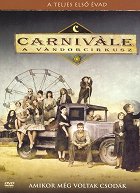Musique:
Jeff BealActeurs·trices:
Michael J. Anderson, Nick Stahl, Adrienne Barbeau, Patrick Bauchau, Debra Christofferson, Tim DeKay, Cynthia Ettinger, John Fleck, Carla Gallo (plus)Saisons(2) / Épisodes(24)
Résumés(1)
En 1934, dans le sud des Etats-Unis en pleine crise économique, un garçon aux étranges pouvoirs est recueilli par les membres d'une foire itinérante. (Canal+)
Critiques (2)
Do you like clarity in everything? Order in things and in relationships? Do you prefer epic stories with clearly defined heroes and readable messages? Well, you've got the wrong address and there's nothing left but to turn elsewhere. Carnivále, without exaggeration, represents the essence of mysterious dramatic creation. Its characters are ambiguous, bizarre, and perfectly fitting the idea of a collection of freaks from Barnum's sleazy show. The destinies of the circus company employees, controlled by the invisible "management," unfold in the 1930s, and from this perspective, it is refined retro from the times of the peak of the economic crisis, where you can directly feel the weight of the fate of unemployed inhabitants of impoverished American Midwestern towns and farmers crushed by poor harvests and loan repayments. The series skillfully balances between mysterious perversity and serious social drama. The storytelling is not rushed, and soon you will realize that, in the case of Carnivále, it is much more about mood and style, about playing with the viewer, about touches with the world beyond consciousness, about constant grappling with paranormal phenomena, about discovering one's own and others' past through fragments of dreams, about flashes of a disturbing future, and about asking burning questions that still lack answers. Carnivále is a labyrinth of mysteries in which you can easily lose direction and purpose. The camera finds beauty in ugliness, the community of worldly individuals finds freedom in shared poverty, the director cleverly plays with details, the screenwriter juggles with words and characters, and all together they contribute to building a peculiar mystical atmosphere. If you surrender to it, you probably won't mind that the plot is not actually essential and at the end of each episode, you don't know much more than at the beginning. The panopticon of characters from caravans with unclear origins and very uncertain futures is worth watching precisely because even in the age of the current boom in quality series, it represents something very exclusive, something for true connoisseurs. Carnivále is not comparable to anything, as it is unique and very impressive. I would gladly take that journey across the United States in those trucks with that gang one more time. Overall impression: 90%.
()
Visually lavish and narratively intricate, Carnivale was HBO's first attempt at TV-fantasy, paving the way for the much better known True Blood. The series is a novel combination of Lynch's Twin Peaks, Browning's Freaks and Steinbeck's Grapes of Wrath. Setting its fantastical plot full of mysticism and the occult in a gritty, period-accurate depiction of the 1930s United States, it strangely combines the surreal with naturalism. A series with such an elaborate mythology and evocative visuals was something unprecedented in its time – I know of no other film or series that evokes the dusty atmosphere of the arid plains of the Dust Bowl so well. But Carnivale was too bold an experiment even by the standards of HBO, which delivers more sophisticated series for a more discerning audience. A strange, provocative, complicated, slow-moving and very expensive series for television, which, like Twin Peaks, lived to see only two seasons, which is a great pity.
()

